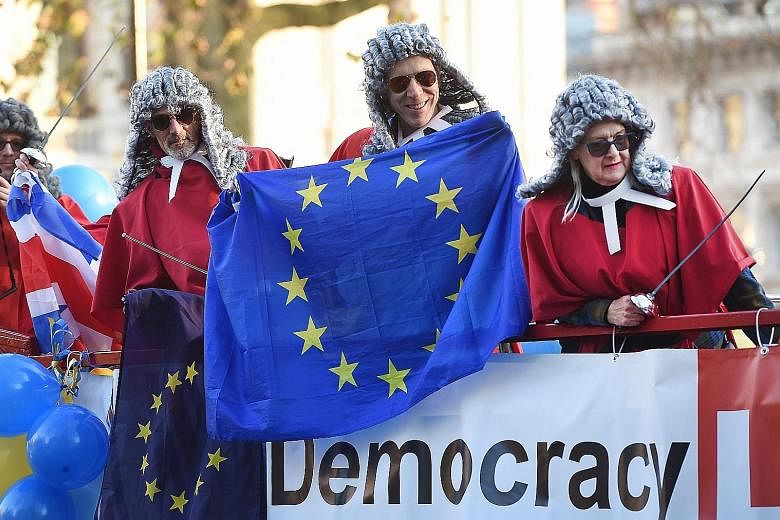LONDON • Britain's Supreme Court president has said a landmark case to decide whether the government can trigger the formal divorce process from the European Union without Parliament's approval was a matter of law, not politics.
Prime Minister Theresa May's government has appealed to the country's highest judicial body after the High Court ruled last month that ministers could not trigger Article 50 of the Lisbon Treaty and begin a two-year Brexit process without lawmakers' assent.
If the Supreme Court upholds the earlier ruling, that could derail Mrs May's planned timetable for invoking Article 50 by the end of March and upset the government's wider Brexit plans.
The legal fight comes against a backdrop of claims by some politicians and newspapers that establishment judges want to thwart Brexit, which Britons voted for by 52-48 per cent in a June referendum.
In his opening remarks yesterday, Supreme Court president David Neuberger said the case was simply about the law.
"We are aware of the strong feelings associated with the many wider political questions surrounding the United Kingdom's departure from the European Union," he said.
"However... those wider political questions are not the subject of this appeal. This appeal is concerned with legal issues and, as judges, our duty is to consider those issues impartially, and to decide the case according to the law. This is what we shall do."
The government's top lawyer, Attorney-General Jeremy Wright told the court the case had been brought "perfectly properly" and raised "issues going to the very heart of our constitutional settlement".
The case is the most high-profile one the court has considered since it came into being seven years ago. It is due to last for four days and, for the first time, all its 11 justices will sit on the panel with the verdict expected later next month.
If the government wins, Mrs May can proceed with her plans to invoke Article 50 by the end of March.
But if she loses, as many legal experts have predicted, Parliament could in theory block Brexit as most lawmakers supported staying in the EU in the June referendum.
Few observers, however, expect Brexit to be blocked. Even so, lawmaker approval could open the process to greater scrutiny and delay.
Investors believe the greater Parliament's involvement, the less chance there is of a "hard Brexit" in which tight controls on immigration are prioritised over European single market access. The pound surged after November's High Court ruling.
The case, which was originally brought by investment fund manager Gina Miller along with hairdresser Deir Tozetti Dos Santos, hinges on whether the government can use a historical power known as "royal prerogative" to invoke Article 50 without lawmakers' assent.
The challengers successfully argued at the High Court that Britons would inevitably lose rights granted by Parliament when leaving the EU, and that under Britain's unwritten Constitution, such rights could be taken away only with MPs' approval.
The Scottish government, which strongly opposes Brexit and has been seeking ways to keep Scotland in the EU, will also put forward its arguments.
Meanwhile, Britain is beginning to prepare its new World Trade Organisation membership terms ahead of Brexit and will seek to closely replicate the existing EU ones, trade minister Liam Fox told Parliament yesterday.
REUTERS

